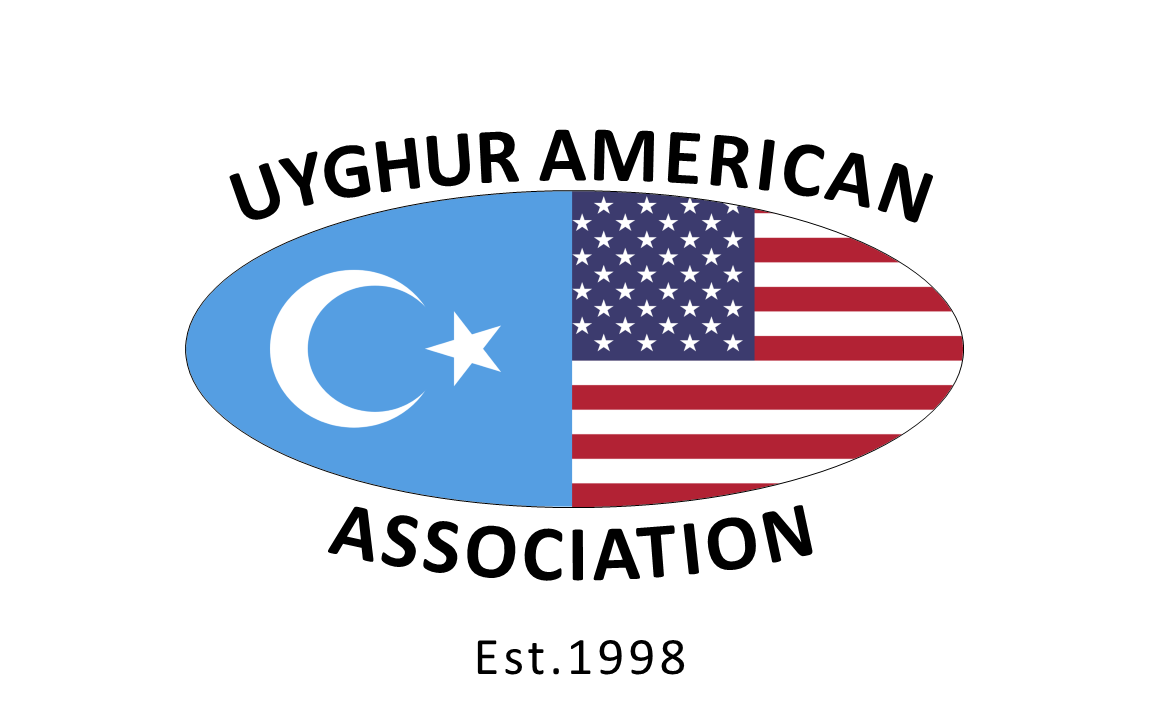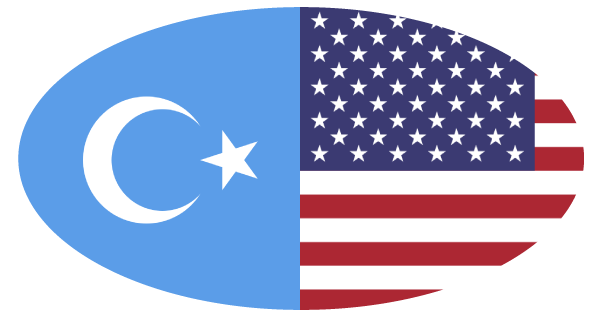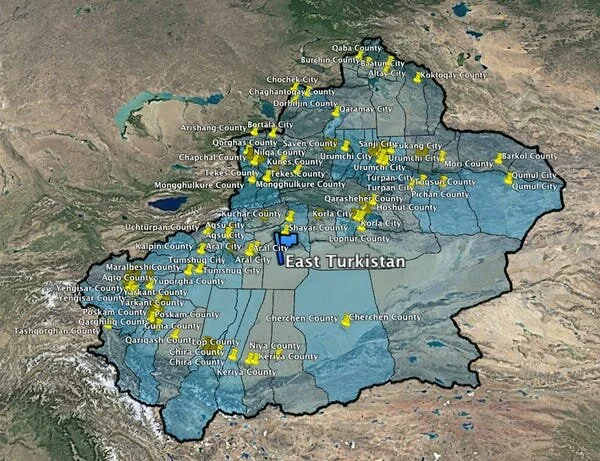
Uyghur Genocide 101
Who are the Uyghurs?
The Uyghurs are a Turkic ethnic group indigenous to East Turkistan, also known as the Xinjiang Uyghur Autonomous Region (XUAR) in the People’s Republic of China. They primarily speak Uyghur, a Turkic language written in a modified-Arabic script. Most Uyghurs practice Sunni Islam, though there are a small number of Uyghur adherents to Christianity. According to Chinese statistics nearly 12 million Uyghurs live in East Turkistan, though Uyghur scholars in the diaspora contend that the Uyghur population of East Turkistan is much higher. There is also a large population of Uyghurs overseas: 220,000 live in Kazakhstan, 60,000 in Turkey, 55,000 in Uzbekistan, and several thousand live in Europe and the United States. The Uyghur people of East Turkistan have a rich history dating back more than 6,000 years, which makes them one of the oldest ethnic groups in Central Asia. Because Uyghurs are a genetic mix of European and Southwest and Central Asian ancestry, they do not physically resemble the Han-majority ethnic population of China.
What is the Uyghur Genocide?
Any discussion of the genocide being perpetrated against the Uyghur people in China first needs to consider the definition and history of the term, genocide. The Convention on the Prevention and Punishment of the Crime of Genocide, a document which emerged in the early years of the United Nations in response to the Holocaust, articulates and defines genocide in its second article, which is quoted in full below.
In the present Convention, genocide means any of the following acts committed with intent to destroy, in whole or in part, a national, ethnical, racial or religious group, as such:
(a) Killing members of the group;
(b) Causing serious bodily or mental harm to members of the group;
(c) Deliberately inflicting on the group conditions of life calculated to bring about its physical destruction in whole or in part;
(d) Imposing measures intended to prevent births within the group;
(e) Forcibly transferring children of the group to another group.
It is important to note that the actions being taken towards Uyghurs in East Turkistan meet each section of this definition. Uyghurs are being killed, harmed physically and mentally, and are subject to conditions of life which are meant to cause the destruction of the Uyghur people. Uyghurs are subject to forced birth control and other family planning measures, and children are separated from families as a result of the system of mass incarceration.
Where is East Turkistan?
East Turkistan is located in Northwest China and spans 640,000 square miles. To give you an idea, that is four times the size of the State of California. It is the largest province-level division of China and borders Mongolia, Russia, Kazakhstan, Kyrgyzstan, Tajikistan, and Afghanistan. It was once the center of the Silk Road, a network of trade routes that connected the East and West from around 114 BCE to 1450 CE. East Turkistan is the largest natural gas-producing region in China; it’s rich in oil, minerals, coal, gold, and other natural resources.
China’s ongoing genocide against the Uyghur people has culminated from a long history of state repression against the Uyghurs and other indigenous peoples of East Turkistan. Uyghur culture has been subject to a state sponsored campaign of suppression since the Manchu Empire, the precursor to the modern Chinese state, invaded and annexed East Turkistan in 1884. The Uyghurs would stage numerous uprisings in 1933 and 1944 to free themselves from Nationalist Chinese rule, twice succeeding in the creation of an independent East Turkistan Republic (ETR). However, negotiations between the Soviet Union and China ultimately dismantled the ETR in 1949; shortly afterwards, Stalin ordered the execution of the ETR’s senior leaders for refusing to sign away the Uyghur nation’s independence.
In 1958, Mao Zedong, China’s communist founder, launched a large-scale “integration” program that forced Uyghurs to abandon their identity and adopt those of the ethnic Han majority population. During the Chinese Cultural Revolution, Uyghurs were similarly targeted—hundreds of thousands of Uyghurs were killed—and identified as “counter revolutionaries and nationalists” by the Chinese government. During this period, China began rewriting Uyghur history by claiming East Turkistan had always been a part of China, rather than a separate historical entity. From 1964-1996, China detonated at least 46 nuclear bombs in East Turkistan as part of its nuclear weapons program, killing nearly 200,000 Uyghurs and afflicting at least 1.5 million more with radiation poisoning.
In 1990, after the defeat of the Soviets in Afghanistan in 1989, Uyghur separatists launched an uprising for East Turkistan’s independence, which the Chinese government brutally quashed. In the coming years, China would use its burgeoning trade position in the international community to assert its economic influence in Central Asia and crush Uyghur political activity. After 9/11, China, under the pretext of combatting “terrorism and extremism,” severely restricted Uyghur language instruction and restricted Uyghur religion and cultural practices.
Repressive Chinese state policies against the Uyghurs, including the prohibition of Muslim names, culminated in demonstrations erupting throughout East Turkistan in 2009, which resulted in thousands of deaths when the Chinese authorities cracked down on protesters. In 2014, China launched a “Strike Hard Campaign Against Violent Terrorism” against the Uyghurs with the stated intention of uprooting terrorism. However, the campaign implemented repressive policies across East Turkistan that essentially labelled the entire Uyghur population as “terrorists.” Again, the Chinese government could wage its brutal crackdown on Uyghurs under the guise of combatting terrorism/extremism, and the world remained largely silent.
In 2016, the first leaked reports surfaced of China’s so-called re-education/vocational skills training camps, where millions of Uyghurs have been forcibly detained in East Turkistan. Though the Chinese government vehemently denies these allegations, the international community has learned through leaked official CCP documents, credible reports, and witness accounts that these “re-education” camps are in fact concentration camps. In these camps, Uyghurs are forced to renounce their faith, language, and culture, and are force-fed CCP propaganda for hours on end. Victims, like Mihrigul Tursun and Zumret Dawut, have testified to widespread human rights abuses in these camps—forced labor, rape, torture, forced sterilizations and abortions, and murder. While so many Uyghur men have been locked up in these concentrations, the Chinese government has deployed Han-Chinese party members to monitor Uyghurs and their families in villages and towns throughout East Turkistan. Under the Pair Up and Become Family program, party members monitor Uyghurs by moving into their homes, where they reportedly force themselves on innocent Uyghur women.
While Uyghurs in the diaspora have fought vigorously for their plight to be recognized as genocide, the term has not been widely used by media outlets, governments, or international organizations. The term genocide as applied to the atrocities in East Turkistan has begun to pick up momentum, especially since Dr. Adrien Zenz’s report from June 2020, where he revealed the Chinese government’s unprecedented mass sterilization and coercive family planning program in East Turkistan. Zenz’s report, which drew on official Chinese government documents, cites 80% of all intrauterine device placements (IUD: a form of birth control) in China are carried out in the Xinjiang province/East Turkistan, despite the fact that the population of East Turkistan only comprises 1.8% of China’s entire population. Because China banned journalists from speaking to the Uyghurs and has kept the concentration camps tightly guarded, it has been difficult to glean more knowledge about the Uyghurs’ plight.
When did the Uyghur Genocide Begin?
Most Uyghurs would definitively place the “beginning of the end” on July 5, 2009, the day the Ürümqi demonstrations erupted.
How can the World Watch in Silence as the Worst Genocide Since the Holocaust Takes Place?
The world at large has continued to ignore the Uyghur genocide for a few key reasons:
Firstly, and most obviously, China is an economic juggernaut and has made clear that any effort by outside nations to interfere with its domestic policies will result in dire economic consequences. Because so many countries around the world are either funded by, invested in, or somehow intertwined with China’s economy, this threat alone is sufficient to deter most nations from getting involved in the Uyghur genocide. These issues have been further exacerbated by the recent Belt and Road project, a neo-colonial infrastructure and investment project which has left many countries in untenable debt towards China.
These factors are key to understanding the continuing acquiescence, and in some cases vocal support, by leaders of majority Muslim countries for China’s suppression of the Uyghurs in East Turkistan. While most people would expect Muslim nations of the world to speak out in support of the Uyghurs, the reason Muslim countries have supported China throughout the Uyghur genocide is simple—most of them rely heavily on China to survive economically and politically. In 2017, Egypt detained and deported at least 34 Uyghur students back to China at the demand of the Chinese government. Countries like Saudi Arabia and Pakistan, both of which are involved in economic contracts with China totaling nearly $70 billion, have turned a blind eye to the Uyghur genocide. Even Turkey’s President Erdogan, the only Muslim world leader to speak out in support of the Uyghurs, eventually recanted his statement after China strongly rebuked him. After all, Turkey is bidding for a key role in one of China’s economic initiatives and China is a key investor in Turkey’s economy.
Secondly, China has adeptly used global Islamophobia to defend itself from any accusations of genocide. China continues to state that its Uyghur policies are necessary to end terrorism and de-extremize the Uyghur people for the sake of Chinese national security. Since the 9/11 terror attacks in the United States, the Chinese government has rebranded the separatist movements in East Turkistan as Islamic terrorist movements, framing their efforts within the “Global War on Terror” in order to win sympathy from the United States and Europe. However, independent China scholars have repeatedly emphasized that while a handful of Uyghurs have been involved in terroristic activities, the vast majority of Uyghurs do not identify with terroristic causes.
Thirdly, China runs a meticulous public image campaign. The Chinese government refers to Uyghur concentration camps as “vocational centers” or “re-education camps” and continues to deny any targeted persecution of the Uyghurs. Anytime leaks are published about the Uyghur concentration camps, China is quick to call it fake news and fabricate evidence debunking the existence of concentration camps, e.g. government-created reports stating drone footage is fake. In the current media and disinformation climate, the simple act of declaring “fake news” often leads people to distrust media sources. There are also many Uyghurs who participate in the Chinese state’s system of colonization in East Turkistan. For example, many Uyghurs work in the state security apparatus, and many Uyghurs participate in the leadership of the Xinjiang Communist Party Administration. Chinese state sources point to these facts as evidence that genocide is not occurring because, why would Uyghurs participate in their own genocide? It must be noted, however, that Uyghurs in the Xinjiang CCP leadership have no real power. Furthermore, the participation of Uyghurs in the state security apparatus is a complicated question. Looking at history, almost every colonial endeavor had some participation from the local population, often for reasons as simple as “needing a job.” It is unreasonable, therefore, to assume that a Uyghur man who joins a city police department in Xinjiang is a pro-Chinese collaborator, just as Indians who joined the British colonial armed forces during the eighteenth century are not considered by historians to be collaborators.
Moreover, China’s promotion of successful Uyghur actresses like Dilraba Dilmurat in popular Chinese dramas and half-Uyghur pop singer Curley Gao is propaganda China uses to lend legitimacy to its oppression of the Uyghur people. In fact, the Nazis, recognizing how valuable a cultural currency entertainment is, created the Jewish Cultural Federation to encourage and support Jewish musicians to participate in “Jewish” and only “Jewish” music. Just as the Nazis did, it’s easy for China to point to one of their highest-earning actresses and retort: “if we’re supposedly carrying out a genocide against Dilraba’s people, then why are we promoting her?”. However, if that were the case, then racism in the United States would have ended with the Obama presidency and the Nazi regime would have never carried out the Holocaust while simultaneously promoting a successful group of Jewish musicians.
Additionally, China purposely advertises Uyghur actresses like Dilraba in highly sexual roles, which serves to further undermine the image of Uyghur women as culturally and religiously conservative who rarely marry outside of their communities. Ironically, Uyghur womens’ sexuality is also weaponized against them — they are often portrayed in Chinese entertainment as seductive accessible sirens, sexual disposable objects that Chinese men can have for themselves; this idea is even more applicable given the fact that many Uyghur women are living and going about life without their husbands, as have been sent to concentration camps. Remember, people like Dilraba are the exception, not the rule; her successful presence in the entertainment industry is meant to lull Uyghurs into a false sense of security, and to believe that their situation is not as bad as they think.
Fourthly, China has denied entry to international media, especially Western media, seeking to speak to Uyghurs or visit the concentration camps. As a result, the world has only learned about the Uyghur genocide through leaked documents, images, and video, Uyghur victims who have managed to escape, and satellite images. Even if the international media were given unfettered access to East Turkistan, Uyghurs are afraid to speak to outsiders because China is monitoring them 24/7. The intense surveillance covers every aspect of Uyghurs’ lives. As mentioned in a previous section, CCP members are deployed to Uyghur homes; any “transgression” could land a Uyghur in the concentration camps. The CCP has mandated apps Uyghurs must download onto their phones so that their activities can be tracked. Suffice it to say, China has maintained iron-clad control over the Uyghur narrative.
Lastly, China has controlled the social media narrative by removing videos supporting the Uyghur cause on TikTok, a social media platform once owned by a Beijing-based company. Similarly, Hong Kong protesters bringing attention to the Uyghur genocide have been effectively silenced with deadly crackdowns and a new security law that criminalizes protesting.



